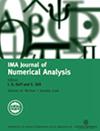Finite element approximation of the Einstein tensor
IF 2.4
2区 数学
Q1 MATHEMATICS, APPLIED
引用次数: 0
Abstract
We construct and analyse finite element approximations of the Einstein tensor in dimension $N \ge 3$. We focus on the setting where a smooth Riemannian metric tensor $g$ on a polyhedral domain $\varOmega \subset \mathbb{R}^{N}$ has been approximated by a piecewise polynomial metric $g_{h}$ on a simplicial triangulation $\mathcal{T}$ of $\varOmega $ having maximum element diameter $h$. We assume that $g_{h}$ possesses single-valued tangential–tangential components on every codimension-$1$ simplex in $\mathcal{T}$. Such a metric is not classically differentiable in general, but it turns out that one can still attribute meaning to its Einstein curvature in a distributional sense. We study the convergence of the distributional Einstein curvature of $g_{h}$ to the Einstein curvature of $g$ under refinement of the triangulation. We show that in the $H^{-2}(\varOmega )$-norm this convergence takes place at a rate of $O(h^{r+1})$ when $g_{h}$ is an optimal-order interpolant of $g$ that is piecewise polynomial of degree $r \ge 1$. We provide numerical evidence to support this claim. In the process of proving our convergence results we derive a few formulas for the evolution of certain geometric quantities under deformations of the metric.爱因斯坦张量的有限元近似
我们构造并分析了维度$N \ge $ 3的爱因斯坦张量的有限元近似。我们关注的是在多面体域$\varOmega \子集$ mathbb{R}^{N}$上的光滑黎曼度量张量$g$被$\varOmega $的简单三角剖分$\mathcal{T}$上的分段多项式度量$g_{h}$所近似,其最大元径$h$。我们假设$g_{h}$在$\mathcal{T}$的每一个余维上都具有单值切-切分量-$1$单纯形。一般来说,这样的度规不是经典可微的,但事实证明,人们仍然可以在分布意义上赋予它的爱因斯坦曲率意义。在三角剖分的细化下,研究了$g_{h}$的分布爱因斯坦曲率收敛于$g$的爱因斯坦曲率。我们证明了在$H^{-2}(\varOmega)$范数中,当$g_{H}$是$g$的最优阶插值,且$g$是次$r \ge $的分段多项式时,这种收敛以$O(H^{r+1})$的速率发生。我们提供了数字证据来支持这一说法。在证明收敛性结果的过程中,我们导出了若干几何量在度规变形下的演化公式。
本文章由计算机程序翻译,如有差异,请以英文原文为准。
求助全文
约1分钟内获得全文
求助全文
来源期刊
CiteScore
5.30
自引率
4.80%
发文量
79
审稿时长
6-12 weeks
期刊介绍:
The IMA Journal of Numerical Analysis (IMAJNA) publishes original contributions to all fields of numerical analysis; articles will be accepted which treat the theory, development or use of practical algorithms and interactions between these aspects. Occasional survey articles are also published.

 求助内容:
求助内容: 应助结果提醒方式:
应助结果提醒方式:


